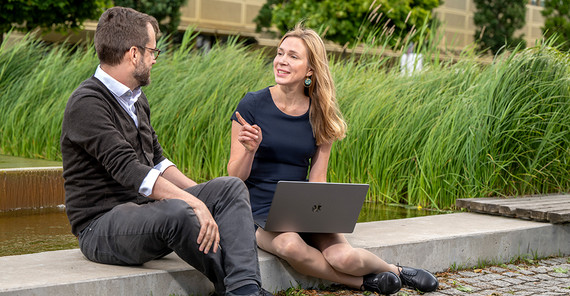"All over the world, NGOs are filling the gaps created when governments withdraw from education," says Nina Kolleck. "But we still know hardly anything about the role they play and how they mold education." In many places, NGOs do indeed create networks to jointly shape education. One example is "Teach for all," which brings together NGOs from more than 50 countries with the goal of radically changing education systems worldwide.
With the help of the ERC starting grant, the educational and political scientist intends to investigate this transformation in more detail. "In these times of increasing inequality, I hope that this project will help shed light on the influence of new players on the education system and bolster equal opportunity efforts around the world."
In her project, the researcher will assess the influence of transnational NGOs by looking at social relations and communication flows. Nina Kolleck developed a new methodological approach for the specific purpose of measuring the "global non-governmental spaces" emerging in education. Among other things, she combines quantitative surveys with the analysis of data from social media platforms such as Twitter as well as artificial intelligence technology for the interpretation of text data – so as to integrate the structural as well as the ideational level into the analysis. "My assumption is that we will not be able to fully understand the influence of NGOs on education until we connect these two different levels," the researcher said. "I also think that our highly interdisciplinary methodology will be applicable in other policy and research areas in the future, such as health policy, global environmental policy, or human rights."
Prof. Dr. Nina Kolleck is the University of Potsdam’s Professor of Educational and Socialization Theory. Before that, she held the positions of Professor of Educational Research, SP Modeling and Analysis of Social Systems at Freie Universität Berlin from 2014 to 2019 and Professor of Political Education and Educational Systems, Institute of Political Science at Leipzig University from 2019 to April 2023. In addition, she was a visiting professor at the University of California Berkeley, the University of British Columbia in Vancouver, the Hebrew University of Jerusalem, and Tel Aviv University. Her research foci include educational policy and equality, extremism, civic and climate education, socialization and social relations, development and youth studies, as well as social network analysis methodologies.
Contact:
Prof. Dr. Nina Kolleck, Professor of Educational and Socialization Theory
Phone: +49 331 977-2176
E-mail: nina.kolleckuuni-potsdampde
Photo: Prof. Dr. Nina Kolleck and Dr. Ronny Patz. Photo: Thomas Roese
Media information 05-07-2023 / No. 075

